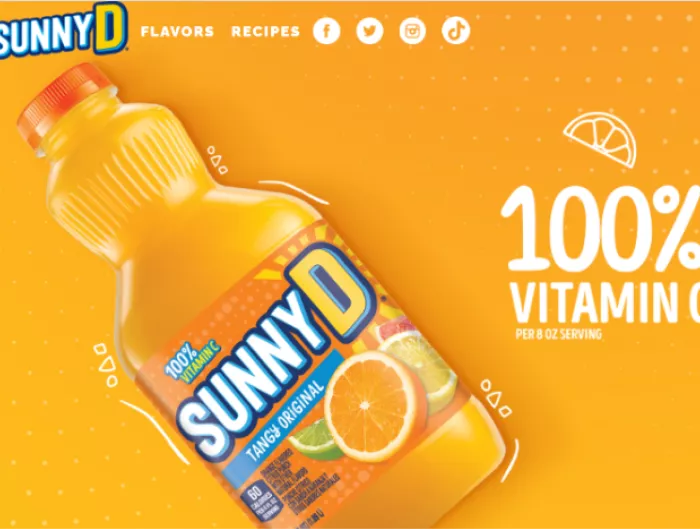Nutrition claims on sugary fruit drink packaging can lead to less healthy choices for young children, new study finds


Parents are more likely to choose a fruit drink with added sugar for their young child when the drink’s packaging includes nutrition-related claims, researchers with the Global Food Research Program found in a study published this month in the American Journal of Clinical Nutrition.
This study is among the first to look at how claims influence parents’ drink purchases for their young children aged 1-5.
In their experiment, the research team invited parents to “shop” in a virtual “convenience store” (similar to a video game) on participants’ own computers. The study’s 2,219 participants were randomly assigned to view fruit drinks displaying one of three claims (“No artificial sweeteners,” “100% Vitamin C,” or “100% All Natural”) or no claim.
The research team found that healthful claims increased misperceptions about nutritional quality. Even though all drink labels also contained nutritional panel information, parents who viewed drinks with claims were more likely to incorrectly believe that the fruit drinks did not contain added sugar or were 100 percent juice.
Fruit drinks are the most popular sugary beverage among young children 0 to 5 years old. There is evidence, however, that consuming drinks containing added sugar can negatively impact children’s health by contributing to overweight, obesity, dental caries, and insulin resistance — a precursor to type II diabetes. Because of this, experts recommend that infants and young children do not consume fruit drinks.
"Parents who saw the claims were more likely to pick the sugary fruit drink instead of water, as well as choose the sugary fruit drink instead of 100 percent fruit juice,” said Marissa Hall, assistant professor at UNC-Chapel Hill’s Gillings School of Global Public Health and the study’s lead author. “The sugary fruit drinks had over 30 grams of added sugar, and that information was right there on the label. But still, the presence of the claim made parents more likely to think that the sugary fruit drinks did not have any added sugar. Also, the claims made parents think that the drinks were 100% fruit juice, which was not the case.”
These findings build on the authors’ research looking at how often nutrition-related claims appear on fruit drinks, how claims relate to drinks’ actual nutritional profile, and whether there are sociodemographic disparities between households that purchase fruit drinks with claims. Key findings from those studies include:
- Nutrition-related claims are ubiquitous: 97 percent of fruit drinks purchased had at least one and, on average, 3 to 4 nutrition-related claims on the front-of-package.
- Fruit drinks with claims related to vitamin C, juice or nectar, fruit or fruit flavor, and “natural” claims were higher in calories and sugar than fruit drinks without these claims.
- Less than a quarter of fruit drinks studied listed juice in their top two ingredients, but over half had juice, nectar, or fruit claims on the front of the package.
- U.S. households with infants and young children from socially disadvantaged groups were more likely to purchase fruit drinks.
Collectively, these studies’ findings suggest a need for stronger regulation of marketing claims on fruit drinks. “Claims can make products seem healthier to parents than they really are,” said Lindsey Smith Taillie, PhD, senior author and assistant professor at Gillings School of Global Public Health. “This is problematic and important from a policy standpoint.”
“The FDA could consider requiring nutrient warning labels or disclaimers on the products to help inform consumers about the risk, or regulating use of certain claim types,” said Hall. “For example, the FDA could prohibit labeling a sugary fruit drink ‘all natural,’ if it contains above a certain amount of added sugar.”
Taillie notes that a precedent for such policies exists in other countries: “In Mexico, for example, beverages that are high in sugar are prohibited from carrying nutrition claims. This type of regulation could help make it easier for parents to be able to quickly and easily sort out the sugary drinks from the healthier options while grocery shopping.”
"The FDA has broad authority to combat deceptive labeling,” said Eva Greenthal, co-author and senior science policy associate at the public health advocacy group, Center for Science in the Public Interest. “The agency should consider requiring nutrient warnings on products that are high in added sugars, requiring more prominent ‘percent juice’ declarations on fruit drink labels, and prohibiting nutrient claims like ‘100% Vitamin C’ on beverages that are high in added sugars.”
“CSPI is also calling on Congress to address misleading claims on packaged foods by passing the Food Labeling Modernization Act,” added Greenthal.
This research was supported by grant #76337 from the Robert Wood Johnson Foundation’s Healthy Eating Research program.
Contact Info: Emily Busey, UNC, 919-230-4980, or Jeff Cronin, CSPI, 202-421-8911

